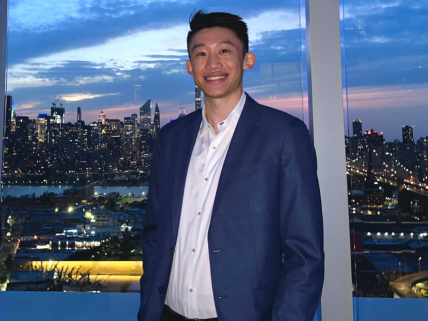Student Spotlight: Jeremy Haoqing Zhu (MPA 2024)

With a passion for improving healthcare systems and policy, Jeremy Haoqing Zhu, an MPA Health Policy and Management student, is studying the healthcare delivery systems of the United States and China in order to analyze strengths, weaknesses, and identify opportunities for innovation.
What motivated you to attend the Wagner School of Public Service?
As my undergraduate life whizzed by during COVID-19 pandemic, it prompted me to reevaluate my career trajectory. In the meantime, my internship experience at Shanghai Jiahui International Hospital highlighted a crucial gap in my understanding—bridging the financial aspects of healthcare with patient-centered care. This realization motivated me to seek a master's program that would empower me in both healthcare and financial management. NYU Wagner stood out as the perfect choice, offering comprehensive training in these areas. I am thrilled to be a part of this program and eager to integrate these skills to contribute effectively to the healthcare field.
How has the MPA Health Policy and Management program enhanced your understanding of the health field?
Through the MPA-HPAM program, my understanding of the health field has been greatly enriched. By offering a holistic view of healthcare services, the program has allowed me to discern patterns in common issues that often afflict diverse organizations within the sector. This comprehensive approach, encompassing studies ranging from individual business cases to the intricate workings of the entire healthcare system, has not only deepened my comprehension of the industry but also provided me with a well-rounded perspective. As a result, I am better equipped to navigate the complexities of the health field, and the program has empowered me to refine my professional interests and carve out a distinct specialization within this multifaceted domain.
You’ve had experience with Ernst & Young Global Consulting Services. Can you share a bit about your responsibilities, any exciting or challenging endeavors, and how the role supports the larger health ecosystem?
During my internship at Ernst & Young, I undertook diverse responsibilities that contributed significantly to the healthcare ecosystem. I spearheaded team presentations that intricately compared the healthcare delivery systems of the US and China. This involved a meticulous analysis of each system's strengths, weaknesses, and potential for improvement. Furthermore, my advocacy for the digitalization of healthcare providers in China showcased a forward-looking approach, aiming to enhance patient care through technological advancements and streamlined operations.
A standout accomplishment was my proposal for Diagnosis-Related Group (DRG) payment models. By suggesting these models, I aimed to bridge the gap between pharmaceutical developments and China's public hospitals. The potential impact of such models is noteworthy, as they can incentivize collaboration between pharmaceutical companies and healthcare providers, ultimately leading to more accessible and effective treatments for patients. Additionally, my contribution to the 2023 E&Y Greater Bay Area (GBA) Health Connect' Whitepaper underscored my commitment to thought leadership. This publication delved into the mutual growth of life sciences and healthcare in the Hong Kong and Shenzhen area, providing valuable insights that could shape policies, investments, and collaborations.
Adapting to the evolving landscape of healthcare posed challenges, particularly transitioning from compliance-focused work to market research. However, this shift empowered me to approach healthcare corporate issues with a more analytical consulting mindset, thereby enhancing my problem-solving capabilities. In a holistic sense, my multifaceted role at Ernst & Young played a pivotal role in advancing innovation, influencing policies, fostering collaboration, and contributing to a more effective and efficient healthcare ecosystem.
What advice would you give to future MPA Health Policy and Management students, either academically or professionally who want to make an impact in health?
The reason we are studying MPA-HPAM reflects our determination to take on a greater role in improving and reforming the healthcare system. We should harness this program to translate our passion into concrete outcomes that contribute to a better future for the next generation.
For future MPA-HPAM students aspiring to drive transformative change in healthcare, it's crucial to grasp the intricate healthcare landscape, cultivate interdisciplinary skills, stay updated with research, gain practical experience, network extensively, champion evidence-based policies, prioritize ethical patient-centered approaches, embrace adaptability, think globally, and carry the ethos of "上医医国、中医医民、下医医病” (Among the practitioners of medicine in ancient times, the most skillful treated the ills of the country, less skilled ones treated people, and the least skilled ones treated diseases) as a reminder of our mission to address healthcare challenges holistically and meaningfully for a better future.